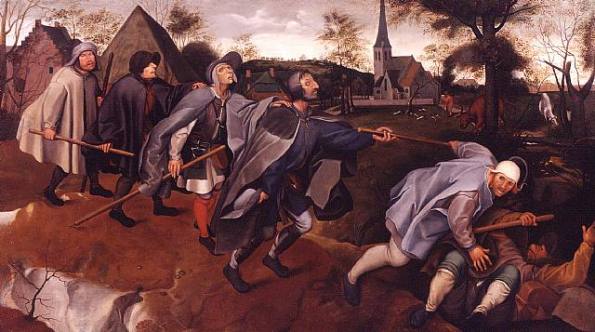
DAILY MEDITATION: “No disciple is superior to the teacher; but when fully trained, every disciple will be like his teacher”
Liturgical day: Friday of the Twenty-third Week in Ordinary Time
 Gospel text (Lk 6,39-42): Jesus told his disciples a parable: “Can a blind person guide a blind person? Will not both fall into a pit? No disciple is superior to the teacher; but when fully trained, every disciple will be like his teacher. Why do you notice the splinter in your brother’s eye, but do not perceive the wooden beam in your own? How can you say to your brother, ‘Brother, let me remove that splinter in your eye,’ when you do not even notice the wooden beam in your own eye? You hypocrite! Remove the wooden beam from your eye first; then you will see clearly to remove the splinter in your brother’s eye.”
Gospel text (Lk 6,39-42): Jesus told his disciples a parable: “Can a blind person guide a blind person? Will not both fall into a pit? No disciple is superior to the teacher; but when fully trained, every disciple will be like his teacher. Why do you notice the splinter in your brother’s eye, but do not perceive the wooden beam in your own? How can you say to your brother, ‘Brother, let me remove that splinter in your eye,’ when you do not even notice the wooden beam in your own eye? You hypocrite! Remove the wooden beam from your eye first; then you will see clearly to remove the splinter in your brother’s eye.”
“No disciple is superior to the teacher; but when fully trained, every disciple will be like his teacher”
Fr. Antoni CAROL i Hostench
(Sant Cugat del Vallès, Barcelona, Spain)
Today, the words of the Gospel make us think about how important examples are along with providing an exemplary life for others. Yes, indeed, we have a saying that goes “‘Friar example’ is the best preacher”, and another one saying “A picture is worth a thousand words.” Let us not forget that we, Christians, are —with no exception!— guides, as our Baptism confers on us a participation in Christ's priesthood (saving intercession): all of us that have received the baptism, have also received the baptismal priesthood. And all priesthood, beyond its mission to sanctify and teach others, also embodies the ‘munus’ —the function— to rule and lead.
Yes, with our behavior —whether we like it or not— we have the opportunity to become a stimulating model for those around us. Let us think, for instance, about the influence parents have over their children, teachers over their pupils, authorities over citizens, etc. And consequently, Christians must be particularly conscious of this fact. For..., “Can a blind person guide a blind person?” (Lk 6, 39).
For us, Christians, what the Jews and the first generations of Christians said of Jesus Christ: “He has done all things well” (Mk 7, 37); “all that Jesus did and taught” (Act 1, 1) should be like a call to attention.
We must try to transform into deeds what we believe in and declare by word of mouth. On one occasion, Pope Benedict XVI, when he still was Cardinal Ratzinger, asserted that “those adapted Christianities are the most threatening danger”, that is, those persons that boast of their Christianity but, in actual practice, their behavior shows they do not manifest the characteristic “radicalism” of the Gospel.
To be radical, though, is not tantamount to be fanatical (for charity is patient and tolerant) or to be immoderate (for moderation is impossible in love matters). As John Paul II has said, “the crucified Lord is an insurmountable testimony of patient love and humble meekness”: He is not fanatic or immoderate. But He is radical, so much so, that the centurion who was present at his death felt like saying: “This man was innocent beyond doubt” (Lk 23, 47).
Source: evangeli.net
Xem bình luận
Sắp xếp

